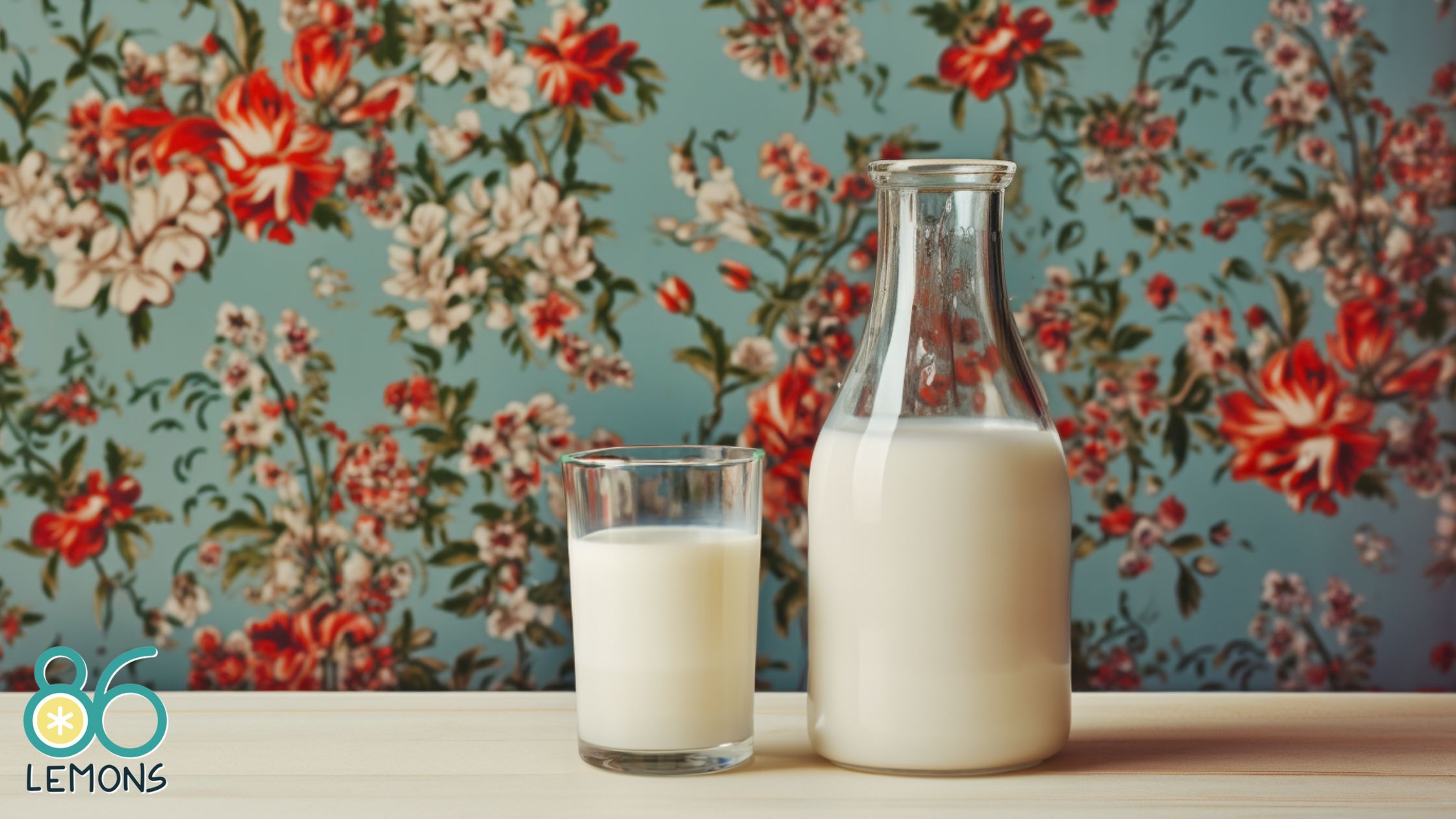Switching to a vegan lifestyle extends beyond just eschewing meat; it involves finding alternatives to all animal-derived products like dairy. Whether due to lactose intolerance, ethical beliefs, or environmental concerns, more people than ever are on the lookout for plant-based substitutes that can replicate the taste and function of conventional dairy.
The good news is that the variety and quality of vegan options have improved dramatically, making it easier for you to enjoy everything from vegan cheeses to vegan substitutes for dairy without sacrificing flavor or texture.
Embracing vegan substitutes doesn’t mean you have to compromise on nutrition or taste. With the right knowledge and tools, cooking and baking with dairy-free alternatives becomes an exciting exploration of new flavors.
These substitutes often come enriched with essential nutrients and can provide a healthy alternative to traditional dairy products. Plus, preparing creative homemade vegan dairy solutions allows you to tailor ingredients to your personal taste preferences and nutritional needs, making your culinary experience even more rewarding.
Key Takeaways
- Vegan substitutes offer a rich variety of options for a dairy-free lifestyle.
- Incorporating plant-based alternatives in your kitchen is simple and enhances your recipes.
- Dairy-free products can be nutritionally beneficial and suit various dietary needs.
The Basics of Vegan Substitutes for Dairy
Embarking on a vegan journey doesn’t mean you have to say goodbye to creamy textures and rich flavors. Your favorite dairy products have exciting plant-based counterparts that provide similar experiences without any animal products. Here’s your go-to guide to navigating the world of vegan dairy substitutes.
Understanding Plant-Based Milk
Your morning cereal and coffee can still be delightful with a variety of plant-based milks. Each offers unique flavor profiles and nutritional benefits:
- Almond milk: A low-calorie option that often includes added calcium.
- Soy milk: A protein-rich milk and a close nutritional match to cow’s milk.
- Oat milk: Known for its creamy texture and oat-enriched goodness.
- Coconut milk: Provides a tropical twist with healthy fats.
Essential Vegan Cheese Alternatives
Vegan cheese has come a long way, with options that melt and stretch:
- Vegan cream cheese: Made from nuts or soy, perfect for bagel spreads.
- Vegan cheese alternatives: Including shreds and slices, made from various plant sources to top your pizzas or enrich your casseroles.
Versatile Vegan Butter and Margarine
To bake or to cook, you’ll find:
- Vegan butter: Coconut, cashew, or almond bases blend with oils to create buttery spreads.
- Margarine: Choose non-hydrogenated versions to avoid trans fats for a heart-healthy choice.
Vegan Creams and Ice Creams
Desserts are still on the table with vegan substitutes:
- Vegan whipped cream: Made from coconut or soy, it whips up fluffy and sweet.
- Cado: A creamier, avocado-based ice cream alternative.
- Vegan ice creams: Utilize almond, coconut, or soy bases to achieve that creamy, dreamy texture.
Incorporating Vegan Substitutes in Cooking and Baking
Dive into the world of vegan substitutes to transform your cooking and baking game! Discover the power of dairy-free ingredients that not only match the richness and texture of traditional dairy products but often provide a nutritional upgrade.
Elevating Dishes with Dairy-Free Options
In the realm of cooking, the secret to creamy sauces and rich dishes lies within the versatility of nuts such as almonds and cashews. By soaking and blending these nuts, you can create luxurious sauces and spreads that pack a flavorful punch.
For example, cashews, when blended, contribute to a silky smooth consistency ideal for creamy pasta or decadent cheese-like sauces. Beyond their texture, these nuts are a great source of protein and essential fats, boosting the nutritional profile of your meals.
An equally wondrous ingredient to keep in your pantry is nutritional yeast, which imparts a cheesy and nutty flavor to your dishes. It’s perfect for sprinkling over popcorn or stirring into mashed potatoes for that cheesy kick without the dairy.
Coconut oil can also be a game-changer in your vegan kitchen. It’s a fantastic butter substitute that can give a subtle coconut flavor to your stir-fries or baked goods, adding a new dimension to your cooking.
Baking Success with Vegan Ingredients
Transitioning to vegan baking can be a breeze with the right substitutes. When it comes to mimicking the properties of butter, non-dairy alternatives like vegan butter substitutes perform wonderfully—providing the same flakiness in pastries and the same moisture in cakes.
Creating vegan buttermilk is as simple as mixing your preferred non-dairy milk, such as almond or coconut, with a touch of apple cider vinegar. The resulting reaction not only mimics the tanginess you’d expect from buttermilk but also helps baked goods rise and develop a tender crumb.
Health and Nutritional Considerations for Dairy Alternatives
When embracing dairy alternatives in your vegan diet, it’s thrilling to discover the variety of options available! But it’s crucial to be aware of how they can affect your nutrition and accommodate health considerations like allergies and intolerances.
Balancing Nutrients in a Vegan Diet
In a vegan diet, finding the perfect balance of nutrients is exhilarating! You have a world of plant-based sources full of proteins, vitamins, and minerals. Delving into soy and pea milk, you’ll find they’re powerhouses, often fortified with calcium and vitamin D, crucial for bone health.
Nutritional standouts like chia seeds and legumes, including beans and lentils, are not just rich in protein but also come with a generous helping of essential fiber and iron.
Vegan yogurts, often made from soy, oats, almonds, or coconut, can be an excellent source of probiotics—the friendly bacteria that keep your digestive system happy. Get creative and sprinkle some mixed seeds like flax or pumpkin seeds for an added crunch and nutrient boost!
Remember that while oils and nut butter can provide essential fatty acids, they should be used in moderation due to their high-calorie content. Choosing options with no added sugars will help maintain your health and energy levels without the sugar crash.
- Protein: Seek out legumes, spinach, and nut butter.
- Calcium: Fortified plant milk and vegan yogurts are your friends.
- Healthy fats: Avocados and seeds like chia offer exciting twists on your meals.
Managing Allergies and Intolerances
If you’re dealing with allergies or intolerances, fear not! Dairy alternatives are a joy to explore. Say goodbye to lactose and hello to a diverse array of non-dairy delights that cater to your needs without compromising on taste or texture.
Almond milk can serve as a subtle, nutty addition to your morning coffee, but if you’re nut-allergic, oat milk stands by as a creamy and delicious alternative.
When seeking alternatives to sour cream, options like vegan sour creams made from tofu or cashews are readily available. However, always check labels for potential allergens hidden in plain sight.
- Lactose intolerance: Embrace plant-based milk and yogurts—they’re naturally lactose-free.
- Nut allergies: Oat and soy-based products are excellent alternatives.
- Protein sensitivity: Swap in pea protein for a gentle yet effective protein source.
Your journey through the realm of vegan dairy substitutes is not just a means to a healthy lifestyle; it’s an adventure of flavors and textures waiting to be discovered!
Creative Home-Made Vegan Dairy Solutions
Embrace the joy of crafting your own vegan dairy alternatives! With a dash of creativity and simple plant-based ingredients, you can whip up delicious dairy-free milk, cheeses, butter, and creams right in your own kitchen.
DIY Plant-Based Milk and Cheese
Milk Alternatives: Begin your homemade dairy-free journey with cashew milk, a creamy delight that’s perfect for your morning cereal or coffee. Here’s a quick recipe:
- Soak 1 cup of cashews overnight.
- Blend with 4 cups of water until smooth.
- Strain using a cheesecloth or a nut milk bag, and enjoy!
For a nutty flavor, try hazelnut milk, or go for oat milk from brands like Oatly for a more neutral taste. Rice and hemp milk are excellent choices for those with nut allergies.
Vegan Cheeses: Transform cashews into smooth cashew cheese with nutritional yeast for a cheesy zest, blend with apple cider vinegar, and add a pinch of salt.
Looking for something more intricate? Make vegan mozzarella that melts and stretches for your pizza nights. Brands like Follow Your Heart and Kite Hill have inspirations for your cheese creations.
Home-Made Vegan Butter and Creams
Butter: Crafting homemade vegan butter is simpler than you think. Combine plant-based oils with something solid at room temperature, like coconut cream, to get that buttery consistency. Add some salt, and you have a spread for toast and baking needs.
Creams: You can create homemade cashew cream by blending soaked cashews with water until silky smooth. For sweeter options, Califia Farms and So Delicious offer coconut or almond-based creamers. But why not try making your own with a blend of avocado and silken tofu for richness without the dairy?
Experiment with these plant-based ingredients and enjoy the variety of health benefits from the vegan options you can create from the comfort of your home.


